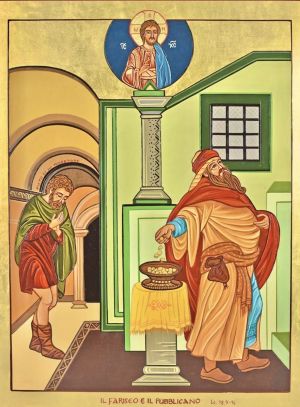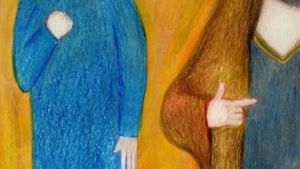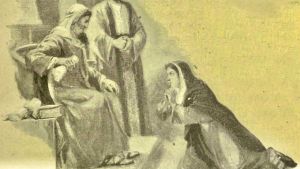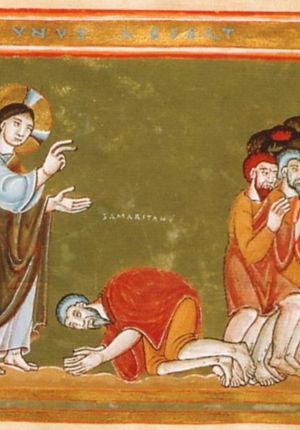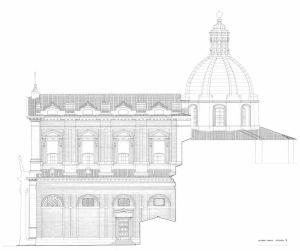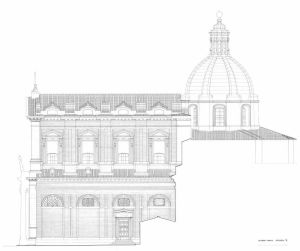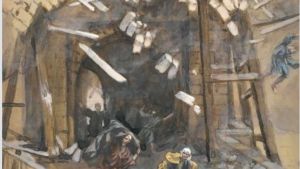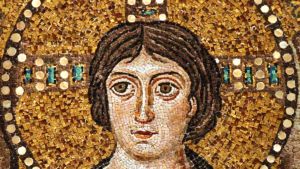
don Giuseppe Nespeca
Giuseppe Nespeca è architetto e sacerdote. Cultore della Sacra scrittura è autore della raccolta "Due Fuochi due Vie - Religione e Fede, Vangeli e Tao"; coautore del libro "Dialogo e Solstizio".
30th Sunday in O.T. (year C)
XXX Sunday in Ordinary Time (year C) [26 October 2025]
May God bless us and may the Virgin protect us. Another lesson on prayer from Jesus in the Gospel, and what a lesson!
First Reading from the Book of Sirach (35:15b-17, 20-22a)
'God does not judge by appearances' (Sir 35) The book of Sirach, written by Ben Sira around 180 BC in Jerusalem, was born in a time of peace and cultural openness under Greek rule. However, this apparent serenity hides a risk: contact between Jewish and Greek culture threatens the purity of the faith, and Ben Sira intends to transmit the religious heritage of Israel in its integrity. The Jewish faith, in fact, is not a theory, but an experience of covenant with the living God, discovered progressively through his works. God is not a human idea, but a surprising revelation, because 'God is God and not a man' (Hos 11:9). The central text affirms that God does not judge according to appearances: while men look at the outside, God looks at the heart. He hears the prayer of the poor, the oppressed, the orphan and the widow, and – in a wonderful image – 'the widow's tears run down God's cheeks', a sign of his mercy that vibrates with compassion. Ben Sira teaches that true prayer arises from precariousness: when man discovers himself to be poor and without support, his heart truly opens to God. Precarity and prayer are of the same family: only those who recognise their weakness pray sincerely. Finally, the sage warns that it is not outward sacrifices that please God, but a pure heart disposed to do good: What pleases the Lord above all is that we keep away from evil. The Lord is a just judge, who does not show partiality, but looks at the truth of the heart. In summary, Ben Sira reminds us that God does not judge by appearances but by the heart, that authentic prayer arises from poverty, and that divine mercy is manifested in his compassionate closeness to the little ones and the humble.
Responsorial Psalm (33/34:2-3, 16, 18, 19, 23)
Here is another alphabetical psalm, i.e., each verse follows the order of the letters of the Hebrew alphabet. This indicates that true wisdom consists in trusting in God in everything, from A to Z. The text echoes the first reading from Sirach, which encouraged the Jews of the second century to maintain the purity of their faith in the face of the seductions of Greek culture. The central theme is the discovery of a God who is close to human beings, especially those who suffer: "The Lord is close to the brokenhearted." This is one of the greatest revelations of the Bible: God is not a distant or jealous being, but a Father who loves and shares in human suffering. Ben Sira poetically said that "our tears flow down God's cheeks": an image of his tender and compassionate mercy. This revelation is rooted in the journey of Israel. In the time of Moses, pagan peoples imagined rival and envious gods. Genesis corrects this view, showing that suspicion of God is a poison, symbolised by the serpent. Through the prophets, Israel gradually came to understand that God is a Father who accompanies, liberates and consoles, the 'God-with-us' (Emmanuel). The burning bush (Ex 3) is the foundation of this faith: 'I have seen the misery of my people, I have heard their cry, I know their sufferings'. Here God reveals himself as the One who sees, listens and acts. He does not remain a spectator, but inspires Moses and his children with the strength to liberate, transforming suffering into hope and commitment. The psalm reflects this experience: after undergoing trials, the people proclaim their praise: "I will bless the Lord at all times" because they have experienced a God who listens, liberates, watches over, saves and redeems. The name "YHWH," the "Lord," indicates precisely the constant presence of God alongside his people. Finally, the text teaches that in times of trial it is not only permissible but necessary to cry out to God: He is attentive to our cry and responds, not always by eliminating suffering, but by making himself present, reawakening trust, and giving us the strength to face evil. In summary, the psalm and the reflection that accompanies it give us three certainties: God is close to those who suffer and hears the cry of the poor. His presence does not take away the pain, but illuminates it and transforms it into hope. True faith comes from trust in this God who sees, hears, frees and accompanies man at all times.
Second Reading from the Second Letter of Saint Paul the Apostle to Timothy (4:6-8, 16-18)
"The good fight" (2 Tim 4:6-18). The text presents St Paul's last spiritual testament, written while he was in prison in Rome, aware that he would soon be executed. The letters to Timothy, although perhaps composed or completed by a disciple, contain his authentic words of farewell, imbued with faith and serenity. Paul describes his imminent death with the Greek verb analuein, which means 'to untie the ropes', 'to weigh anchor', 'to dismantle the tent': images that evoke the departure for a new journey, the one towards eternity. Looking back, the apostle takes stock of his life using the sporting metaphor of running and fighting: "I have fought the good fight, I have finished the race, I have kept the faith." Like an athlete who never gives up, Paul has reached the finish line and knows that he will receive the "crown of righteousness," the reward promised to all the faithful. He does not boast about himself, because this crown is not a personal privilege, but a gift offered to all those who have lovingly desired the manifestation of Christ. The 'just judge', God, does not look at appearances but at the heart — as Sirach taught — and will give glory not only to Paul, but to all those who live in the hope of the Lord's coming. The apostle's life was a constant race towards the glorious manifestation of Christ, the horizon of his faith and his service. He recognises that the strength to persevere does not come from him, but from God himself: 'The Lord gave me strength, so that I might fulfil the proclamation of the gospel and all nations might hear it'. This divine strength sustained his mission, enabling him to proclaim Christ until the end. Paul explains that Christian life is not a competition, but a shared race, in which each person is called to run at their own pace, with the same ardent desire for the coming of Christ. In his letter to Titus, he defined Christians as those who “wait for the blessed hope and the appearing of the glory of our great God and Saviour Jesus Christ” — words that the liturgy repeats every day at Mass. In his hour of trial, Paul also confesses the loneliness of the apostle: The first time I made my defence, no one came to my support, but all deserted me. May it not be held against them (v. 16) . Like Jesus on the cross and Stephen at the moment of his stoning, he forgives and transforms abandonment into an experience of intimate communion with the Lord, who becomes his only strength and consolation. Paul is the poor man of whom Ben Sira speaks, the one whom God listens to and consoles, the one whose tears flow down God's cheeks. His final words reveal the hope that overcomes death: "So I was delivered from the lion's mouth. The Lord will deliver me from all evil and bring me safely into heaven, and save me in his kingdom" (vv. 17-18). He does not speak of physical deliverance - he knows that death is imminent - but of spiritual deliverance from the greatest danger: losing faith, ceasing to fight. The Lord has kept him faithful and given him perseverance until the end. For Paul, death is not defeat, but a passage to glory. It is the birth into true life, the entrance into the Kingdom where he will sing forever: 'To him be glory for ever and ever. Amen.'
In summary: The text presents Paul as a model of the believer who is faithful to the end. He experiences death as a departure towards God, not as an end. He looks at life as a race sustained by grace. He recognises that strength and perseverance come from the Lord. He understands that the reward is promised to all who desire the coming of Christ. He forgives those who abandon him and finds God's presence in solitude and weakness. He sees death as a passage into the glory of the Kingdom. Paul's "good fight" thus becomes the struggle of every Christian: to remain faithful in trials, to the point of running the last stretch with our gaze fixed on Christ, the source of strength, peace and hope.
*From the Gospel according to Luke (18:9-14)
A small preliminary observation before entering into the text: Luke clearly tells us that this is a parable... so we must not imagine that all the Pharisees or all the tax collectors of Jesus' time were like those described here. No Pharisee or tax collector perfectly matched this portrait: Jesus actually presents us with two very typical and simplified inner attitudes to highlight the moral of the story. He wants us to reflect on our own attitude, because we will probably recognise ourselves now in one, now in the other, depending on the day. Let us move on to the parable: last Sunday, Luke already offered us a teaching on prayer; the parable of the widow and the unjust judge taught us to pray without ever becoming discouraged. Today, however, it is a tax collector who is offered as an example. What relationship, one might ask, can there be between a poor widow and a rich tax collector? It is certainly not the bank account that is at issue, but the disposition of the heart. The widow is poor and forced to humble herself before a judge who ignores her; the tax collector, perhaps wealthy, bears the burden of a bad reputation, which is another form of poverty. Tax collectors were unpopular, and often not without reason: they lived in a period of Roman occupation and worked in the service of the occupiers. They were considered 'collaborators'. In addition, they dealt with a sensitive issue in every age: taxes. Rome set the amount due, and the tax collectors advanced it, then received full powers to recover it from their fellow citizens... often with a large profit margin. When Zacchaeus promises Jesus to repay four times as much to those he has defrauded, the suspicion is confirmed. Therefore, when the tax collector in the parable does not dare to raise his eyes to heaven and beats his breast saying, 'O God, have mercy on me, a sinner', perhaps he is only telling the plain truth. Being true before God, recognising one's own fragility: this is true prayer. It is this sincerity that makes him 'righteous' on his return home, says Jesus. The Pharisees, on the other hand, enjoyed an excellent reputation: their scrupulous fidelity to the Law, fasting twice a week (more than the Law required!), regular almsgiving, all expressed their desire to please God. And everything the Pharisee says in his prayer is true: he invents nothing. But, in reality, he does not pray. He contemplates himself. He looks at himself with complacency: he needs nothing, asks for nothing. He takes stock of his merits — and he has many! — but God does not think in terms of merit: his love is free, and all he asks is that we trust him. Let us imagine a journalist at the exit of the Temple interviewing the two men: Sir, what did you expect from God when you entered the Temple? Yes, I expected something. And did you receive it? Yes, and even more. And you, Mr Pharisee? No, I received nothing... A moment of silence, then he adds: But I didn't expect anything, after all. The concluding sentence of the parable sums it all up: "Whoever exalts himself will be humbled, and whoever humbles himself will be exalted." Jesus does not want to present God as a moral accountant who distributes rewards and punishments. He states a profound truth: those who exalt themselves, that is, those who believe themselves to be greater than they are, like the Pharisee, close their hearts and look down on others. But those who believe themselves to be superior lose the richness of others and isolate themselves from God, who never forces the door of the heart. We remain as we were, with our human 'righteousness', so different from the divine. On the contrary, those who humble themselves, who recognise themselves as small and poor, see superiority in others and can draw on their wealth. As St Paul says: 'Consider others superior to yourselves.' And this is true: every person we meet has something we do not have. This perspective opens the heart and allows God to fill us with his gift. It is not a question of an inferiority complex, but of the truth of the heart. It is precisely when we recognise that we are not 'brilliant' that the great adventure with God can begin. Ultimately, this parable is a magnificent illustration of the first beatitude: 'Blessed are the poor in spirit, for theirs is the kingdom of heaven'.
+ Giovanni D'Ercole
I-Pharisee and I-publican: God's Creative Action. Prayer of Faith, or of manner
29th Sunday in O.T. (year C)
29th Sunday in Ordinary Time (year C) [19 October 2025]
May God bless us and may the Virgin Mary protect us. Once again, a strong reminder of how to live our faith in every situation in life.
First Reading from the Book of Exodus (17:8-13)
The test of faith. On Israel's journey through the desert, the encounter with the Amalekites marks a decisive stage: it is the first battle of the people freed from Egypt, but also the first great test of their faith. The Amalekites, descendants of Esau, represent in biblical tradition the hereditary enemy, a figure of evil who tries to prevent God's people from reaching the promised land. Their sudden attack on the rear of the caravan — the weakest and most tired — reveals the logic of evil: to strike where faith falters, where fatigue and fear open the door to doubt. This episode takes place at Rephidim, the same place as Massah and Meribah, where Israel had already murmured against God because of the lack of water. There the people had experienced the trial of thirst, now they experience the trial of combat: in both cases, the temptation is the same — to think that God is no longer with them. But once again God intervenes, showing that faith is purified through struggle and that trust must remain firm even in danger. While Joshua fights in the plain, Moses climbs the mountain with God's staff in his hand — a sign of his presence and power. The story does not focus on the movements of the troops, but on Moses' gesture: his hands raised towards the sky. It is not a magical gesture: it is prayer that sustains the battle, faith that becomes strength for the whole people. When Moses' arms fall, Israel loses; when they remain raised, Israel wins. Victory therefore depends not only on the strength of weapons, but on communion with God and persevering prayer. Moses grows tired, Aaron and Hur support his hands: this is the image of spiritual brotherhood, of the community that bears the weight of faith together. Thus, prayer is not isolation, but solidarity: those who pray support others, and those who fight draw strength from the prayers of their brothers and sisters. This episode thus becomes a paradigm of spiritual life: Israel, fragile and still on its journey, learns that victory does not come from human strength, but from trust in God. Prayer, represented by Moses' raised hands, does not replace action but accompanies and transfigures it. The person who prays and the person who fights are two faces of the same believer: one fights in the world, the other intercedes before God, and both participate in the one work of salvation. Finally, the praying community becomes the living sign of God's presence at work in his people, and when a believer no longer has the strength to pray, the faith of his brothers and sisters sustains him. The story of Amalek at Rephidim is not just a page in history, but an icon of Christian life: we all live our battles knowing that victory belongs to God and that prayer is the source of all strength and the guarantee of God's presence.
Responsorial Psalm (120/121)
Psalm 120/121 belongs to the group of 'Psalms of Ascents' (Ps 120-134), composed to accompany the pilgrimages of the people of Israel to Jerusalem, the holy city situated on high, symbol of the place where God dwells among his people. The verb 'to ascend' indicates not only geographical ascent but also and above all a spiritual movement, a conversion of the heart that brings the believer closer to God. Each pilgrimage was a sign of the Covenant and an act of faith for Israel: the people, travelling from all parts of the country, renewed their trust in the Lord. When the psalm speaks in the first person — "I lift up my eyes to the mountains" — it actually gives voice to the collective "we" of all Israel, the people marching towards God. This journey is an image of the entire history of Israel, a long march in which fatigue, waiting, danger and trust are intertwined. The roads that lead to Jerusalem, in addition to being stone roads, are spiritual paths marked by trials and risks. Fatigue, loneliness, external threats — robbers, animals, scorching sun, cold nights — become symbols of the difficulties of faith. In this situation, the words of the psalm are a profession of absolute trust: "My help comes from the Lord: he made heaven and earth." These words affirm that true help comes not from human powers or mute idols, but from the living God, Creator of the universe, who never sleeps and never abandons his people. He is called "the Guardian of Israel": the one who watches over us constantly, who accompanies us, who is close to us like a shadow that protects us from the sun and the moon. The Hebrew expression "at your right hand" indicates an intimate and faithful presence, like that of an inseparable companion. The people who pray this psalm thus remember the pillar of cloud and fire that guided Israel in the desert, a sign of God who protects day and night, accompanying them on their journey and guarding their lives. Therefore, the psalmist can say: 'The Lord will guard you from all evil; he will guard your life. The Lord will guard you when you go out and when you come in, from now on and forever." The pilgrim who "goes up" to Jerusalem becomes the image of the believer who entrusts himself to God alone, renouncing idols and false securities. This movement is conversion: turning away from what is vain to turn towards the God who saves. In the New Testament, Jesus himself was able to pray this psalm as he "went up to Jerusalem" (Lk 9:51). He walks the path of Israel and of every human being, entrusting his life to the Father. The words "The Lord will guard your life" find their full fulfilment at Easter, when the pilgrim's return becomes resurrection because it is a return to new and definitive life. Thus, Psalm 121 is much more than a prayer for travel: it is the confession of faith of a people on a journey, the proclamation that God is faithful and that his presence accompanies every step of existence. In it, historical memory, theological trust and eschatological hope come together. Israel, the believer and Christ himself share the same certainty: God guards life and every ascent, even the most difficult, leads to communion with Him.
Second Reading from the Letter of Saint Paul to Timothy (3:14-4:2)
In this passage from the second letter to Timothy (3:14-4:2), Paul entrusts his disciple with the most precious legacy: fidelity to the Word of God. It is a text written at a difficult time, marked by doctrinal confusion and tensions in the community of Ephesus. Timothy is called to be a 'guardian of the Word' in the midst of a world that risks losing the truth it has received. The first words, 'Remain faithful to what you have learned', make it clear that others have abandoned the apostolic teaching: fidelity then becomes an act of spiritual resistance, a remaining anchored to the source. Paul speaks of 'dwelling' in the Word: faith is not an object to be possessed, but an environment in which to live. Timothy entered into it as a child thanks to his mother Eunice and his grandmother Lois, women of faith who passed on to him a love for the Scriptures. Here we have a reference to the communal and traditional character of faith: no one discovers the Word on their own, but always in the Church. Access to Scripture takes place within the living Tradition, that 'chain' that starts with Christ, passes through the apostles and continues in believers. 'Tradere' in Latin means 'to transmit': what is received is given. In this fidelity, Scripture is a source of living water that regenerates the believer and roots him in the truth. Paul affirms that the Holy Scriptures can instruct for the salvation that is obtained through faith in Christ Jesus (v. 15). The Old Testament is the path that leads to Christ: the entire history of Israel prepares for the fulfilment of the Paschal mystery. 'All Scripture is inspired by God': even before it became dogma, it was the deep conviction of the people of Israel, from which arose respect for the holy books kept in the synagogues. Divine inspiration does not cancel out the human word, but transfigures it, making it an instrument of the Spirit. Scripture, therefore, is not just another book, but a living presence of God that forms, educates, corrects and sanctifies: thanks to it, the man of God will be perfect, equipped for every good work (vv. 16-17). From this source springs the mission, and Paul entrusts Timothy with the decisive command: "Proclaim the Word, insist on it at the opportune and inopportune moment" (v. 4:2) because the proclamation of the Gospel is a necessity, not an optional task. The solemn reference to Christ's judgement of the living and the dead shows the gravity of apostolic responsibility. Proclaiming the Word means making present the Logos, that is, Christ himself, the living Word of the Father. It is He who communicates himself through the voice of the preacher and the life of the witness. But proclamation requires courage and patience: it is necessary to speak when it is convenient and when it is not, to admonish, correct, encourage, always with a spirit of charity and a desire to build up the community. Truth without love hurts; love without truth empties the Word. For Paul, Scripture is not only memory, but the dynamism of the Spirit. It shapes the mind and heart, forms judgement, inspires choices. Those who dwell in it become "men of God," that is, persons shaped by the Word and made capable of serving. Timothy is invited not only to guard the doctrine, but to make it a source of life for himself and for others. Thus, the Word, accepted and lived, becomes a place of encounter with Christ and a source of renewal for the Church. The apostle does not found anything of his own, but transmits what he has received; in the same way, every believer is called to become a link in this living chain, so that the Word may continue to flow in the world like water that quenches, purifies and fertilises. In summary: Scripture is the source of faith, Tradition is the river that transmits it, and proclamation is the fruit that nourishes the life of the Church. To remain in the Word means to remain in Christ; to proclaim it means to let Him act and speak through us. Only in this way does the man of God become fully formed and the community grow in truth and charity.
From the Gospel according to Luke (18:1-8)
The context of this parable is that of the 'end times': Jesus is walking towards Jerusalem, towards His Passion, death and Resurrection. The disciples perceive the tragic and mysterious epilogue, feel the need for greater faith ('Increase our faith') and are anxious to understand the coming of the Kingdom of God. The term 'Son of Man', already present in Daniel (7), indicates the one who comes on the clouds, receives universal and eternal kingship, and also represents, in the original sense, a collective being, the people of the Saints of the Most High. Jesus uses it to refer to himself, reassuring his disciples about God's ultimate victory, even in a context of imminent difficulties. The reference to judgement and the Kingdom emphasises the eschatological perspective: God will do justice to his chosen ones, the Kingdom has already begun, but it will be fully realised at the end. The parable of the persistent widow is at the heart of the message: before an unjust judge, the widow is not discouraged because her cause is just. This example combines two virtues essential to Christians: humility, recognising one's poverty (first beatitude: 'Blessed are you who are poor, for yours is the Kingdom of God'), and perseverance, confident insistence in prayer and justice. The widow's persistence becomes a paradigm for faith in waiting for the Kingdom: our cause, too, based on God's will, requires tenacity. The text also recalls the connection with the episode in the Old Testament: during the battle against the Amalekites, Moses prays persistently on the hill while Joshua fights on the plain. The victory of the people depends on the presence and intervention of God, supported by Moses' persevering prayer. The parable of the widow has the same function: to remind believers, of all times, that faith is a continuous struggle, a test of endurance in the face of difficulties, opposition and doubts. Jesus' concluding question, "When the Son of Man comes, will he find faith on earth?", is a universal warning: faith should never be taken for granted; it must be guarded, nurtured and protected. From the early morning of the Resurrection until the final coming of the Son of Man, faith is a struggle of constancy and trust, even when the Kingdom seems far away. The widow teaches us how to face the wait: humble, stubborn, confident, aware of our weakness but certain of God's justice and saving will, which never disappoints those who trust in him totally. Luke seems to be writing to a community threatened by discouragement, as suggested by the final sentence: 'When the Son of Man comes, will he find faith on earth?'. This phrase, while appearing pessimistic, is actually a warning to be vigilant: faith must be guarded and nurtured, not taken for granted. The text forms an inclusion: the first sentence teaches what faith is — 'We must always pray without losing heart' — and the final sentence calls for perseverance. Between the two, the example of the stubborn widow, treated unjustly but who does not give up, shows concretely how to practise this faith. The overall teaching is clear: faith is a constant commitment, an active resistance, which requires stubbornness, humility and trust in God's justice, even in the face of difficulties and the apparent absence of a response.
+ Giovanni D'Ercole
Prayer: Faith-appropriation. Scandal of waiting
28th Sunday in O.T. (year C)
XXVIII Sunday in Ordinary Time (year C) [12 October 2025]
May God bless us and may the Virgin Mary protect us! Reflecting on the gratitude that is easier to see in those who are far away is an invitation to review our personal relationship with God.
First Reading from the Second Book of Kings (5:14-17)
This Sunday's reading begins at the moment when General Naaman, apparently as docile as a lamb, immerses himself in the waters of the Jordan, on the orders of the prophet Elisha; but we are missing the beginning of the story: let me tell it to you. Naaman is a Syrian general highly esteemed by the king of Aram (present-day Damascus). Obviously, for the people of Israel, he is a foreigner and at times even an enemy, and above all, being a pagan, he does not belong to the chosen people. Even more serious: he is a leper, which means that soon everyone will avoid him, and for him it is a real curse. Fortunately for him, his wife has an Israelite slave girl who tells her mistress, 'There is a great prophet in Samaria who could surely heal Naaman'. The mistress tells her husband Naaman, who tells the king of Aram: the prophet of Samaria can heal me. And since Naaman is in great favour, the king writes a letter of introduction to the king of Samaria recommending Naaman, who is afflicted with leprosy, to go to the prophet Elisha. The king of Israel does not know that the prophet Elisha can heal him; on the contrary, he is in a panic because he thinks that the king of Syria is looking for a pretext to wage war on him. Elisha hears about this and asks Naaman to come. Naaman arrives with his entire entourage and luggage full of gifts for the healer. In reality, only a servant opens the door slightly and simply tells him that his master orders him to immerse himself seven times in the Jordan to be purified. Naaman finds this offensive and wonders what is the point of immersing himself in the Jordan when there are rivers in Syria that are much more beautiful than the Jordan. Enraged, he sets off again for Damascus, but fortunately his servants say to him: 'Did you expect the prophet to ask you to do extraordinary things to heal you, and you would have done them? Now he is asking you to do something ordinary, so why can't you do it? Naaman allows himself to be persuaded, and this is where today's reading begins. Naaman obeys a simple order by immersing himself seven times in the Jordan and is healed. It seems simple to us, but for a great general of a foreign army, this obedience is not simple at all! The rest of the text demonstrates this. Naaman is healed and returns to Elisha to tell him two things. The first: 'Now I know that there is no God in all the earth except in Israel', and he adds that when he returns to his country, he will offer sacrifices to him. The author of this passage takes the opportunity to say to the Jews: you have had the protection of the one God for centuries, and now you see that God is also for foreigners, while you continue to be tempted by idolatry. This foreigner, on the other hand, quickly understood where his healing came from. Naaman also tells Elisha that he wants to give him a gift to thank him, but the prophet refuses emphatically: God's gifts cannot be bought. Finally, why does Naaman want to take some soil from Israel with him? He explains that he does not want to offer burnt offerings and sacrifices to other gods, but only to the God of Israel. This shows that, at the time of the prophet Elisha, all the peoples neighbouring Israel believed that the gods reigned over specific territories and, in order to offer sacrifices to the God of Israel, Naaman believed he had to take with him some soil from the land over which this God reigned.
Responsorial Psalm (97/98, 1-4)
In the first reading, Naaman, a Syrian general and therefore a pagan, is healed by the prophet Elisha and, thanks to this, discovers the God of Israel. Naaman is therefore perfectly suited to sing this psalm, which speaks of God's love both for the pagans, whom the Bible calls the nations (or peoples), and for Israel. 'The Lord has made known his salvation, he has revealed his justice in the sight of the nations' (v. 2) and immediately afterwards (v. 3): 'He has remembered his love, his faithfulness to the house of Israel', which is the consecrated expression to remember the election of Israel, the completely privileged relationship that binds this small people to the God of the universe. The simple words "his faithfulness" and "his love" are a reference to the Covenant: it is through these words that, in the desert, God made himself known to the people he chose. The phrase "God of love and faithfulness" indicates that Israel is the chosen people, but the previous phrase reminds us that if Israel has been chosen, it is not to enjoy the privilege selfishly, not to consider itself the only child, but to behave as an older brother, and its role is to proclaim God's love for all people, so as to gradually integrate all humanity into the Covenant. In this psalm, this certainty even marks the composition of the text; if you look more closely, you will notice the inclusion of verses 2 and 3. I would remind you that inclusion is a literary device often found in the Bible. It is a bit like a box in a newspaper or magazine; obviously, the purpose is to highlight the text written inside the box. In the Bible, it works the same way: the central text is highlighted, framed by two identical phrases, one before and one after. Here, the central phrase speaks of Israel, the chosen people, and is framed by two phrases that speak of the nations: the first phrase, 'The Lord has made known his salvation, he has revealed his righteousness in the sight of the nations', and the second concerns Israel: "He has remembered his love, his faithfulness to the house of Israel" and the third: "All the ends of the earth have seen the victory of our God". Here the term "the nations" does not appear but is replaced by the expression "all the ends of the earth". This means that the election of Israel is central, but we must not forget that it must radiate to all humanity. A second emphasis of this psalm is the very marked proclamation of God's kingship. For example, in the Temple of Jerusalem they sing: "Acclaim the Lord, all the earth, acclaim your king." This psalm is a cry of victory, the cry that rises on the battlefield after triumph, the teru'ah in honour of the victor. The victory of God, referred to here, is twofold: first, it is the victory of liberation from Egypt, and second, it is the victory expected at the end of time, God's definitive victory over all the forces of evil. Even then, God was acclaimed as the new king was once acclaimed on the day of his coronation, with cries of victory to the sound of trumpets, horns and the applause of the crowd. But while with the kings of the earth there was always disappointment, this time we know that we will not be disappointed; that is why this time the teru'ah must be particularly vibrant! Christians acclaim God with even greater force, because they have seen the king of the world with their own eyes: since the Incarnation of the Son, they know and affirm, against all apparent evidence to the contrary, that the Kingdom of God, that is, of love, has already begun.
Second Reading from the Second Letter of Saint Paul the Apostle to Timothy (2:8-13)
The hymn "Remember Jesus Christ, risen from the dead; he is our salvation, our eternal glory" is found in its original context in the Second Letter to Timothy, where Paul writes: "Remember Jesus Christ, descendant of David". In the Jewish milieu, it was essential to affirm that Jesus was truly of the lineage of David in order to be recognised as the Messiah. Paul adds: 'He was raised from the dead: this is my Gospel'. The question is radical: either Jesus rose from the dead, or he did not. Paul, initially convinced that it was an invention, had tried to prevent the spread of this proclamation. But after his experience on the road to Damascus, he saw the Risen One and became his witness. Jesus is the conqueror of death and evil, and with him a new world is born, in which believers must participate with their whole lives. For this reason, Paul consecrates himself to proclaiming the Gospel and invites Timothy to do the same, preparing him for opposition and encouraging him to fight the good fight with courage, gentleness and trust in the Spirit he has received. The resurrection is the heart of the Christian faith. While for many Jews the resurrection of the flesh was credible, for the Greeks it was difficult to accept, as shown by the failure of Paul's preaching in Athens. Precisely because of his proclamation of the resurrection, Paul was imprisoned several times: "Christ has been raised from the dead; this is my Gospel. For his sake I suffer, even to the point of being chained like a criminal." Timothy, too, Paul warns, will have to suffer for the Gospel. Paul's chains do not stop the truth: 'I am in chains, but the Word of God is not in chains'. Jesus himself had said that if they remain silent, the stones will cry out, because nothing can stop the truth. Paul adds that he endures everything for the elect, so that they too may obtain the salvation that is in Christ Jesus, with eternal glory. Here the opening hymn echoes and probably follows an ancient baptismal hymn introduced with the formula: "Here is a word worthy of faith: If we died with him, we will live with him; if we persevere, we will reign with him." It is the mystery of Baptism, already explained in Romans 6: with it we are immersed in the death and resurrection of Christ, united with him in an inseparable way. Passion, death and resurrection constitute a single event that inaugurated a new era for humanity. The last sentences highlight the tension between human freedom and God's faithfulness because if we deny him, he too will deny us: God respects our conscious rejection. If we lack faith, he remains faithful, because he cannot deny himself, since God always remains faithful even in the face of our frailty.
From the Gospel according to Luke (17:11-19)
Jesus is on his way to Jerusalem, where his passion, death and resurrection await him. Luke emphasises the itinerary because what he narrates is linked to the mystery of salvation. During the journey, he meets ten lepers who, forced to remain at a distance according to the Law, cry out to him, calling him 'Master': this is a sign both of their weakness and of the trust they place in him. Unlike another episode (Lk 5:12), this time Jesus does not touch them, but only orders them to go and present themselves to the priests, a necessary step for official recognition of their healing. The order is already a promise of salvation. The story recalls the episode of Naaman and the prophet Elisha (2 Kings 5) in the first reading because as the ten set out on their journey, their leprosy disappears: their trust saves them. The disease had united them, but the healing reveals the difference in their hearts: nine Jews go to the priests, only one, a Samaritan, considered a heretic, returns. He recognises that life and healing come from God, glorifies God aloud, prostrates himself at Jesus' feet and gives him thanks: an attitude reserved for God. Thus he recognises the Messiah and understands that the true place to give glory to God is no longer the Temple in Jerusalem, but Jesus himself. His return is conversion, and Jesus proclaims it: "Get up and go; your faith has saved you." Jesus asks the other nine to account for themselves: they met the Messiah but did not recognise him, choosing to run immediately to the Temple to fulfil the Law without stopping to give thanks. The Gospel thus emphasises a recurring theme: salvation is for everyone, but often it is not those closest to God who welcome it: "He came among his own, and his own did not recognise him." Already the Old Testament affirmed the universality of salvation (cf. Ps 97/98). The first reading recalls the conversion of Naaman, a foreigner, and Jesus had rebuked Nazareth, citing the example of the Syrian who was healed while many lepers in Israel were not (Lk 4:27), arousing the anger of the synagogue. In Acts, Luke will again show the contrast between the rejection of part of Israel and the acceptance of the pagans. This question was alive in the early Christian communities: did one have to be Jewish to receive baptism, or could pagans also be accepted? The story of the converted Samaritan recalls three truths: the salvation brought by Christ through his passion, death and resurrection is for everyone; thanksgiving is often best performed by foreigners or heretics; the poor are the most open to encountering God. In conclusion, on the road to Jerusalem, that is, to salvation, Jesus leads all men who are willing to convert, whatever their origin or religion.
+ Giovanni D'Ercole
From Healing to the Journey to the Temple, to Personal foreign Faith
TRAUMATIC OR PRECARIOUS EXPERIENCES. «DARKNESS»: APATHY, DEPRESSION, PSYCHOSIS, HOSTILITY - (by Francesco Giovannozzi, psychologist and psychotherapist)
A look into the «darkness».
As I have already mentioned, many poets and writers have described the flow of the human soul.
Eugenio Montale expresses this in one of his poems from 1925, on the pain of living, providing us with the image of a stream that cannot flow, a leaf crumpled by excessive heat, a horse exhausted on the ground.
These are images that linger in our minds, leaving us with food for thought and questions to ponder.
There have been moments of 'darkness' in our lives, and perhaps there will be more.
Feelings of discouragement and not knowing which path to take - each of us has experienced this first-hand.
The intensity and duration of the 'darkness' vary depending on the circumstances and our personal ability to react.
We react differently to defeat or disappointment; what upsets one person may leave another completely indifferent.
An encounter with 'darkness' can be common when faced with serious difficulties such as bereavement, loss of employment, the onset of illness, the end of a relationship, and so on.
This state of mind is temporary and ends spontaneously, without bringing about changes in a person's life.
In other cases, it is important not to underestimate this state of mind, as it could be a sign of psychosomatic or psychological distress.
In these cases, we often experience inexplicable feelings of worry and apathy, and we feel more fatigued.
Let us remember that the reaction to 'darkness' often follows a traumatic experience, which in ordinary circumstances would not have caused any temporary feelings of low mood.
A more severe and prolonged reaction, one that the individual cannot overcome on their own, is an unusual condition.
In older people, emotional shocks can trigger moments of 'darkness' more easily than in younger people.
Sometimes older people are marginalised, have fewer social relationships, and often suffer a loss of prestige, especially when they lose hope.
But even adolescents [with their precariousness] are not immune to these moments of unease.
It is not true that adolescence is a happy time of life; on the contrary, it is perhaps one of the most troubled.
In these moments of 'darkness', which clinicians call «depression», we notice that people going through this phase greatly reduce their activities, have less self-confidence, and take an interest in few things.
They are able to keep their jobs even if they have to work harder. Usually, their memory and relationship with reality are not altered - unless a serious condition («psychosis») has arisen.
Arieti describes the depression we have called 'darkness' here as a combination of sadness and pessimism.
The latter is the essential element of the combination; the unhealthy idea is to believe that what has happened to a person will always happen to them, or that their state of mind will never change.
Defeatism, the illusion of knowing what will happen to us in the future, consolidates sadness into 'darkness'.
Often the 'darkness' of the soul is discharged onto the body.
We may experience weight loss, feelings of oppression in the heart, decreased bodily secretions, insomnia, and frequent headaches.
In our behaviour towards others, 'darkness' makes us tend to exploit and influence others; it makes us unwilling to be persuaded. We find it difficult to satisfy others, and hostility often overwhelms us.
Faber Andrew wrote a poem entitled “To those who are going through their darkness”...
The poet invites the reader to «believe in poetry. In the eyes of those who have already found that road».
Then again: «There is a sky here waiting for you, with a breathtaking panorama of dreams».
For a poet, poetry is the main road, but we who are not poets have something to believe in, and that is the pillar of our reality.
Let us always remember that when the night reaches its darkest point, the dawn of a new day begins.
Francesco Giovannozzi, psychologist and psychotherapist.
AGITATION, RESTLESSNESS, WORRIES, FEAR - (by Francesco Giovannozzi, psychologist and psychotherapist)
In today's society, there are many factors that cause anxiety and restlessness, and strategies to combat them are often difficult to find.
This period is characterised by the 'shaking' of fundamental values, norms and aspirations that drove man towards fulfilment and healthy relationships with others.
The current wars around the world, the memories of them for older people, and the threat of nuclear war add to the list.
In such a hostile climate, human isolation is accentuated.
Each person has their own way of reacting: the most common is a sense of unease, anxiety, feeling in danger without knowing what the danger is; a sense of ruin, or something else.
We often fail to understand the cause of all this. People feel helpless, and if this unease is strong, it can be discharged onto the body.
Muscle stiffness may be noticed, or there may be tremors, a feeling of weakness or tiredness; even the voice may tremble.
At the cardiovascular level, palpitations, fainting, increased heart rate and increased blood pressure may occur.
Nausea, vomiting and stomach ache may also occur in the intestines, which have no organic origin.
There may also be other symptoms typical of each person's history, and there is no organ that cannot be affected by internal tension.
I remember that in my professional life I have met people with psychological problems that were 'discharged' in different parts of the body, sometimes in the most unimaginable places.
I have encountered alopecia (hair loss), locked limbs, visual disturbances, fainting, and more recently, teenagers who cut themselves...
If a person feels overwhelmed by a sudden wave of inner discomfort, they may react inappropriately or even dangerously (alcohol, drugs, speeding, gambling, etc.).
Understanding these disturbances, worries and anxieties is important in determining whether they are normal or not.
Unusual states of anxiety are distinguished from more or less persistent apprehension with acute crises.
These states are to be distinguished from the state of generalised worry that we find common in our daily lives.
Let us remember that in order to define our anxiety and agitation, we must convince ourselves that it is something normal when the individual feels threatened.
Agitation should be distinguished from fear, where the danger is real: the individual can assess the situation and choose whether to face it or flee.
When we talk about agitation in the normal sense, we mean that it is human nature to feel it when faced with danger, illness, etc.
It represents the deepest way of living our human existence.
It makes us face our limits and weaknesses, which are not manifestations of inner discomfort or illness, but expressions of human nature.
The more aware we are of our limits, the better we are able to live with our anxieties.
For our fellow human beings who feel omnipotent, agitation and anxiety are unbearable, as they bring to consciousness the limits that are a wound to their 'feeling of being a superior creature'.
We experience normal unease even when we leave an 'old road for a new one'.
From this point of view, it accompanies us in our changes, in our evolution, and in finding meaning in our lives.
Dr Francesco Giovannozzi, psychologist and psychotherapist
Conversion and Times: Faith of the fourth year
Against the tide Transfiguration: Faith and Metamorphosis
And quite often we too, beaten by the trials of life, have cried out to the Lord: “Why do you remain silent and do nothing for me?”. Especially when it seems we are sinking, because love or the project in which we had laid great hopes disappears (Pope Francis)
E tante volte anche noi, assaliti dalle prove della vita, abbiamo gridato al Signore: “Perché resti in silenzio e non fai nulla per me?”. Soprattutto quando ci sembra di affondare, perché l’amore o il progetto nel quale avevamo riposto grandi speranze svanisce (Papa Francesco)
The Kingdom of God grows here on earth, in the history of humanity, by virtue of an initial sowing, that is, of a foundation, which comes from God, and of a mysterious work of God himself, which continues to cultivate the Church down the centuries. The scythe of sacrifice is also present in God's action with regard to the Kingdom: the development of the Kingdom cannot be achieved without suffering (John Paul II)
Il Regno di Dio cresce qui sulla terra, nella storia dell’umanità, in virtù di una semina iniziale, cioè di una fondazione, che viene da Dio, e di un misterioso operare di Dio stesso, che continua a coltivare la Chiesa lungo i secoli. Nell’azione di Dio in ordine al Regno è presente anche la falce del sacrificio: lo sviluppo del Regno non si realizza senza sofferenza (Giovanni Paolo II)
For those who first heard Jesus, as for us, the symbol of light evokes the desire for truth and the thirst for the fullness of knowledge which are imprinted deep within every human being. When the light fades or vanishes altogether, we no longer see things as they really are. In the heart of the night we can feel frightened and insecure, and we impatiently await the coming of the light of dawn. Dear young people, it is up to you to be the watchmen of the morning (cf. Is 21:11-12) who announce the coming of the sun who is the Risen Christ! (John Paul II)
Per quanti da principio ascoltarono Gesù, come anche per noi, il simbolo della luce evoca il desiderio di verità e la sete di giungere alla pienezza della conoscenza, impressi nell'intimo di ogni essere umano. Quando la luce va scemando o scompare del tutto, non si riesce più a distinguere la realtà circostante. Nel cuore della notte ci si può sentire intimoriti ed insicuri, e si attende allora con impazienza l'arrivo della luce dell'aurora. Cari giovani, tocca a voi essere le sentinelle del mattino (cfr Is 21, 11-12) che annunciano l'avvento del sole che è Cristo risorto! (Giovanni Paolo II)
Christ compares himself to the sower and explains that the seed is the word (cf. Mk 4: 14); those who hear it, accept it and bear fruit (cf. Mk 4: 20) take part in the Kingdom of God, that is, they live under his lordship. They remain in the world, but are no longer of the world. They bear within them a seed of eternity a principle of transformation [Pope Benedict]
Cristo si paragona al seminatore e spiega che il seme è la Parola (cfr Mc 4,14): coloro che l’ascoltano, l’accolgono e portano frutto (cfr Mc 4,20) fanno parte del Regno di Dio, cioè vivono sotto la sua signoria; rimangono nel mondo, ma non sono più del mondo; portano in sé un germe di eternità, un principio di trasformazione [Papa Benedetto]
In one of his most celebrated sermons, Saint Bernard of Clairvaux “recreates”, as it were, the scene where God and humanity wait for Mary to say “yes”. Turning to her he begs: “[…] Arise, run, open up! Arise with faith, run with your devotion, open up with your consent!” [Pope Benedict]
duevie.art
don Giuseppe Nespeca
Tel. 333-1329741
Disclaimer
Questo blog non rappresenta una testata giornalistica in quanto viene aggiornato senza alcuna periodicità. Non può pertanto considerarsi un prodotto editoriale ai sensi della legge N°62 del 07/03/2001.
Le immagini sono tratte da internet, ma se il loro uso violasse diritti d'autore, lo si comunichi all'autore del blog che provvederà alla loro pronta rimozione.
L'autore dichiara di non essere responsabile dei commenti lasciati nei post. Eventuali commenti dei lettori, lesivi dell'immagine o dell'onorabilità di persone terze, il cui contenuto fosse ritenuto non idoneo alla pubblicazione verranno insindacabilmente rimossi.


